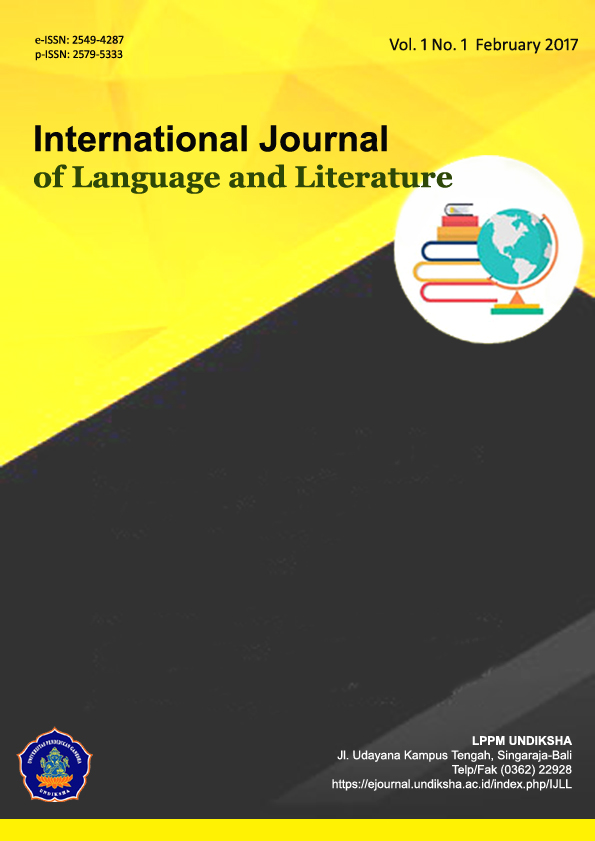PROGRESSIVE INTERVIEW LEARNING MODEL AS INNOVATION IN IMPROVING STUDENTS’ LITERACY
DOI:
https://doi.org/10.23887/ijll.v2i1.16092Kata Kunci:
learning model, literacy competence, progressive interview, language proficiencyAbstrak
This study aims to create a learning model that able to improve students' literacy skills. Within the research method development, the Progressive Interview Learning Model (PILM) has been refined and empowered continuously so the students are gradually treated in the lectures. This study used a total sample, i.e. students who take the Sociolinguistics course. Students are given experience in a structured group. The sample follows lectures with Progressive Interview Learning Model in the classroom, around the campus, and within the community. In the classroom, the interview activity is conducted to college friends about a free topic. In the campus environment, the interview is conducted to structural officials, lecturers, educational staff, and other staff with the topic of information about the lecture smoothness. While in the community, students conduct interviews with community leaders about leadership on religious, economic, security, cultural, social, educational, and community topics. The results showed that students' literacy ability increased significantly.The implication for literacy teacher can be integrated with four language skill in learning.Referensi
Arikunto, S. (2006). Prosedur Penelitian: Suatu Pendekatan Praktik. PT. Rineka Cipta, Jakarta.
Adi, I N. S. M., N. N. Padmadewi, N. M. Ratminingsih.(2017).The Effect of STAD UponStudents with DifferentLevel of Self EsteemTowardReadingComprehension of EleventhGradeStudents of SMAN 1 KediriTabanan in The AcademicYear 2013/2014.International Language and Literature. https://ejournal.undiksha.ac.id/index.php/IJLL/article/view/12547. pp 158-166
Beaver, B. And Tuck, B. The Adjustment of Overseas Students at a Tertiary in New Zealand (1998). New Zealand Journal of Educational Studies, 33 (2), pp 167-179.
Brown, H. D. (2007). Prinsip Pembelajaran dan Pengajaran Bahasa.USA: Pearson Education Inc
Chaer, A.danAgustina, L. (2010).Sosiolinguistik. Jakarta: RinekaCipta
Farida, S. Faktor-Faktor Penyebab Keengganan Membaca di Lingkungan Mahasiswa: Studi Kasus. Prosiding Seminar Nasional Bahasa 2012. Fakultas Bahasa Universitas Widyatama http://repository.widyatama.ac.id/
Hamid, M. (2016). Desain Induk Gerakan Literasi Sekolah. Jakarta: Direktorat Jenderal Pendidikan Dasar dan Menengah Kementerian Pendidikan dan Kebudayaan[online] http://repositori.perpustakaan.kemdikbud.go.id/39/1/ Desain-Induk-Gerakan-Literasi-Sekolah.pdf
http://rumahliterasiku.org/Tafsir Bebas Atas Tagline “Pantang Tanya Sebelum Baca” [Online]
http://www.pediapendidikan.com/2016/07/konsep-literasi-dan-gls.html.
http://www.indonesiapisacenter.com/2013/08/sekilas-tentang-pisa_3.html.
Maryam, S, et al.(2013).Literasi Sastra pada Mahasiswa Program Studi Pendidikan Bahasa dan Sastra Indonesia. Atikan: Jurnal Kajian Pendidikan. 3 (2) Desember 2013.
Maryam, S.(2007). Pengembangan Kreativitas Berbahasa dalam Menulis Esai. Educasionist Journal. [online] http://file.upi.edu/Direktori/ JURNAL /EDUCATIONIST/Vol._I_No._2-Juli_2007/5_Siti_Maryam_Layout2rev.pdf. pp. 103-115.
Maryani. (2011). Peningkatan Kemampuan Mengubah Teks Wawancara Menjadi Teks Narasi Melalui Teknik Diskusi pada Siswa Kelas VII-B Sekolah Menengah Pertama Negeri 2 Gadingrejo Tahun Pelajaran 2010/2011. Skripsi. Lampung: FKIP Universitas Lampung. [Online] http://digilib.unila.ac.id/698/2/Abstrak.pdf
MacKenzie, N. (1970). Teaching and Learning. Belgium : Unesco.
Nasir, M. (2015).PengembanganMutu Modal Manusia, Kelembagaan, danInovasi.http://www.iseisby.or.id/attachments/article/181/Materi%20MENRISTEK.pdf.[Online]
Nuraini, F. (2007).ProfilKeterampilanBertanyaSiswapadaPembelajaranBiologi SMA Negeri 2 Bandar Lampung TahunPelajaran 2016/2017.Skripsi.http://digilib.unila.ac.id/26682/3/SKRIPSI%20TANPA%20BAB%2PEMBAHASAN.pdf
Pedoman Akademik FKIP Universitas Suryakancana Cianjur 2016/2017. Kurikulum 2016 Program Studi Pendidikan Bahasa Indonesia. Tidak Diterbitkan.
Permanasari, R.C. (2014). Improving Students’ Speaking Skill Through Three Steps Interview Technique(An Action Research of the Tenth Grade Students of SMK Negeri 9 Semarang in the Academic Year of 2013/2014). Skripsi. Universitas Negeri Semarang
Sari, E. S. & Pujiono, S. (April 2017). Budaya Literasi mahasiswa FBS UNY. LITERA Volume 16 Nomor 1, 105-113. [online] https://journal.uny.ac.id/index.php/litera/issue/view/1409
Sitthisak, O., Gilbert, L. An Evaluation of Generated Question Sequences Based on Competency Modeling. (2010) Proceedings of the 18th International Conference on Computers in Education: Enhancing and Sustaining New Knowledge Through the Use of Digital Technology in Education, ICCE 2010, pp. 220-227.
Sudaryat,Y.(2016). “Bahasa SundadalamGamitanKearifanLokaldanPendidikan”.Pidato Pengukuhan Guru Besar. [Online] http://berita.upi.edu/?p=11149
Sukmadinata, N.Sy. (2011). Metode Penelitian Pendidikan.Bandung: Rosdakarya.
Sumiani, N.W. (2014). PeningkatanKemampuanMengembangkanHasil WawancaraMenjadiKaranganNaratifdenganPendekatanIntegratifSiswaKelas VII E SMP Negeri 2 BangliTahunPelajaran 2013/2014.Skripsi. Denpasar: UniversitasMahasaraswati. Online http://unmas-library.ac.id/wp-content/uploads/2014/11/SKRIPSI4.pdf
Sunardi. (2016).Pengembangan 4Cs dalam Pembelajaran Matematika Sebuah Tantangan Pengembangan Kurikulum Matematika. http://pasca.um.ac.id/wp-content/uploads /2016/09/ProsidingPendidikan Matematika Pasca UM2016.pdf
Trianto.(2011). ModelPembelajaranTerpadu. Jakarta: BumiAksara.
Wahyuni, S. and Badriyah, L. (2015). Using ThinkPair Share Method to ImproveThe ReadingSkill on NarrativeText of The Students of MTsnKunirBlitar. Jurnal RealitaVol. 13 No. 1 Januari 2015 | 97-111 [Online] http://download.portalgaruda.org/article.php?article
Unduhan
Diterbitkan
Cara Mengutip
Terbitan
Bagian
Lisensi
IJLL Journal provides immediate open access to its content on the principle that making research freely available to the public to supports a greater global exchange of knowledge.

This work is licensed under a Creative Commons Attribution-ShareAlike 4.0 International License







